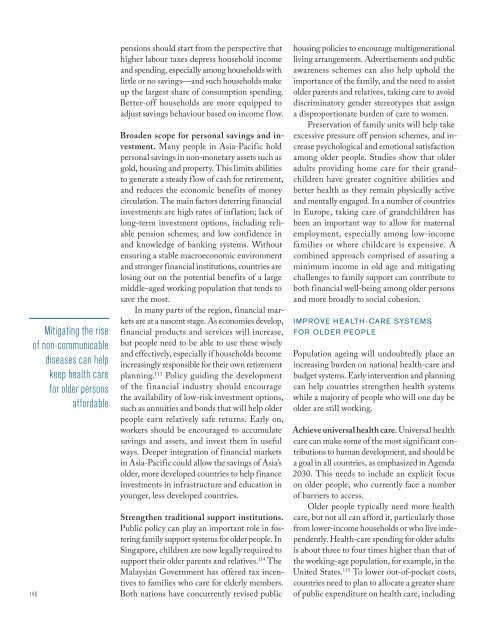SHAPING THE FUTURE HOW CHANGING DEMOGRAPHICS CAN POWER HUMAN DEVELOPMENT
23XELCz
23XELCz
You also want an ePaper? Increase the reach of your titles
YUMPU automatically turns print PDFs into web optimized ePapers that Google loves.
Mitigating the rise<br />
of non-communicable<br />
diseases can help<br />
keep health care<br />
for older persons<br />
affordable<br />
146<br />
pensions should start from the perspective that<br />
higher labour taxes depress household income<br />
and spending, especially among households with<br />
little or no savings—and such households make<br />
up the largest share of consumption spending.<br />
Better-off households are more equipped to<br />
adjust savings behaviour based on income flow.<br />
Broaden scope for personal savings and investment.<br />
Many people in Asia-Pacific hold<br />
personal savings in non-monetary assets such as<br />
gold, housing and property. This limits abilities<br />
to generate a steady flow of cash for retirement,<br />
and reduces the economic benefits of money<br />
circulation. The main factors deterring financial<br />
investments are high rates of inflation; lack of<br />
long-term investment options, including reliable<br />
pension schemes; and low confidence in<br />
and knowledge of banking systems. Without<br />
ensuring a stable macroeconomic environment<br />
and stronger financial institutions, countries are<br />
losing out on the potential benefits of a large<br />
middle-aged working population that tends to<br />
save the most.<br />
In many parts of the region, financial markets<br />
are at a nascent stage. As economies develop,<br />
financial products and services will increase,<br />
but people need to be able to use these wisely<br />
and effectively, especially if households become<br />
increasingly responsible for their own retirement<br />
planning. 113 Policy guiding the development<br />
of the financial industry should encourage<br />
the availability of low-risk investment options,<br />
such as annuities and bonds that will help older<br />
people earn relatively safe returns. Early on,<br />
workers should be encouraged to accumulate<br />
savings and assets, and invest them in useful<br />
ways. Deeper integration of financial markets<br />
in Asia-Pacific could allow the savings of Asia’s<br />
older, more developed countries to help finance<br />
investments in infrastructure and education in<br />
younger, less developed countries.<br />
Strengthen traditional support institutions.<br />
Public policy can play an important role in fostering<br />
family support systems for older people. In<br />
Singapore, children are now legally required to<br />
support their older parents and relatives. 114 The<br />
Malaysian Government has offered tax incentives<br />
to families who care for elderly members.<br />
Both nations have concurrently revised public<br />
housing policies to encourage multigenerational<br />
living arrangements. Advertisements and public<br />
awareness schemes can also help uphold the<br />
importance of the family, and the need to assist<br />
older parents and relatives, taking care to avoid<br />
discriminatory gender stereotypes that assign<br />
a disproportionate burden of care to women.<br />
Preservation of family units will help take<br />
excessive pressure off pension schemes, and increase<br />
psychological and emotional satisfaction<br />
among older people. Studies show that older<br />
adults providing home care for their grandchildren<br />
have greater cognitive abilities and<br />
better health as they remain physically active<br />
and mentally engaged. In a number of countries<br />
in Europe, taking care of grandchildren has<br />
been an important way to allow for maternal<br />
employment, especially among low-income<br />
families or where childcare is expensive. A<br />
combined approach comprised of assuring a<br />
minimum income in old age and mitigating<br />
challenges to family support can contribute to<br />
both financial well-being among older persons<br />
and more broadly to social cohesion.<br />
IMPROVE HEALTH-CARE SYSTEMS<br />
FOR OLDER PEOPLE<br />
Population ageing will undoubtedly place an<br />
increasing burden on national health-care and<br />
budget systems. Early intervention and planning<br />
can help countries strengthen health systems<br />
while a majority of people who will one day be<br />
older are still working.<br />
Achieve universal health care. Universal health<br />
care can make some of the most significant contributions<br />
to human development, and should be<br />
a goal in all countries, as emphasized in Agenda<br />
2030. This needs to include an explicit focus<br />
on older people, who currently face a number<br />
of barriers to access.<br />
Older people typically need more health<br />
care, but not all can afford it, particularly those<br />
from lower-income households or who live independently.<br />
Health-care spending for older adults<br />
is about three to four times higher than that of<br />
the working-age population, for example, in the<br />
United States. 115 To lower out-of-pocket costs,<br />
countries need to plan to allocate a greater share<br />
of public expenditure on health care, including


